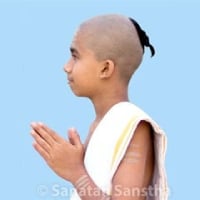Dharma preaches that the purpose of human birth is God-realisation. The religious scriptures therefore impart guidance on how to undertake spiritual practice so as to be able to get closer to God in every incident of life, right from birth till death. Sanskars should be performed to get closer to God in the sixteen rituals in life from conception to marriage. These sanskars later help in improving spiritual practice.
The Vedic rituals performed by the mother, father and the Guru on the son or daughter from the time of conception till marriage, so that they may perform balanced sattvik actions are referred to as the sanskars. There are important 16 sanskar.
Sanskar is a process of increasing the potential in ourselves. The origin of the word sanskar is सम् (sam) + कृ (kru) + घञ् (ghyan) = संस्कार (sanskar). Thus the word sanskar is formed by prefixing the preposition ‘sam’ (denoting balance), to the verb ‘kru’ and suffixing ‘ghyan’ to it.
It has multiple meanings, such as – to improve, to purify, to remove shortcomings in an object and to endow a new, attractive form to it. In short, the process by which positive qualities in man are developed and enhanced is known as a sanskar.
1. Naimittik-karma, sanskars, festivals and religious festivals
A. Naimittik-karma
A naimittik-karma is one that is performed for a specific reason, at a specific time or on a specific day or a similar day. An action taken for some reason, at the time or day of the reason or similar day is an incidental action. For example the birth of a child becomes a reason. The ritual, which should be performed immediately upon its birth or on the same day next year, is said to be a naimittik-karma.
B. Sanskar
The ritual that should be performed on the day of the birth of a son or a daughter is called ‘sanskar’.
C. Festival or religious festival
A birthday performed on the same day in subsequent years is called a ‘festival’ or a ‘religious festival’.
2. Importance of 16 Sanskar
A. Philosophy and science underlying the 16 sanskar
Sages of yesteryears focussed their efforts on every individual for the overall progress of mankind. Complete spiritual evolution resulting from the sanskars benefits the individual. The individual can gain all-round prosperity and is able to lead a courageous and happy life and also contribute to the spiritual evolution of the society. This would lead to strengthening of the society, which in turn would contribute to the prosperity of the Nation. Should this process continue unhindered in the society, the society in turn would help every individual become worthy. With a view to give fillip to continuation of this process, the arrangement of 16 sanskar has been developed. The 16 sanskar from birth till death are suitable as per the prevailing age of the individual and the circumstances.
B. Destruction of 16 sanskar that support, foster and protect us will lead to our downfall !
‘Garbhadhan’ is the first and ‘antyeshti’ (Last rites) is the last sanskar. In both these sanskars, the individual is dependent. Here it is the tradition that protects, supports and fosters us. It makes us prosperous. Today, the antyeshti sanskar is a mere formality. Shraddh-paksha etc. have been discarded. As the last two generations have taken birth without the Garbhadhan sanskar, those aware of its importance should perform this sanskar with some repentance.
C. Sanskars are essential for making life happy
Coal from the mines becomes a radiant diamond only after it undergoes a fine chiselling process. With chiselling of more facets (sanskar), it can turn into the world’s best diamond, akin to the Kohinoor. In Hindu Dharma, there are sixteen sanskars that give more and more facets to human life. There are sanskars to make post-death life happy. Make your and others lives happy by following these sanskars.
D. Importance as per psychology
Sanskars make the mind-set of an individual of a specific type. As per the science of psychology, there is a strong relationship between the mind-set and the goal to be achieved.
E. Sanskars are essential so as not to forget God
When in the womb, from the fourth or fifth month onwards we are intensely aware of our sorrows. Then, we remember hundreds of our past births. A stark awareness dawns on us that ‘inspite of knowing the worth of human life in each of those births, we have not done anything for God-realisation and wasted our entire life’. So we then pray, “O God, liberate me from the agonies of the womb. Once you liberate me from this suffocating space, I shall not get entrapped in the web of materialistic world like the last time. I shall devote myself to You and seek fulfilment of human life worthwhile.” However, after coming out of the womb, we again forget God. The reason for forgetting God then is our state of happiness, in other words, we feel we are happy. This proves that the only reason for not loving God devoutly is the ‘worldly happiness or end of sorrow (unhappiness)’.
For this reason, there are various sanskars that need to be performed right from birth; therefore the parents have to pay strict attention to the son’s traits till his thread ceremony is performed. After the thread ceremony, he lives in his Guru’s house for 12 years and learns the Vedas and other scriptures. He also acquires requisite knowledge of pravrutti, nivrutti and Dharma; and then decides whether to get married or be celibate and thereafter returns home. The knowledge he acquires in his mother’s womb is due to his union with God. As that knowledge gets strengthened in the Guru’s home he comes home with equal faith in the Vedas, God and Sadguru. No matter whether he adheres to the path of pravrutti or nivrutti, he becomes a recipient of Divine knowledge at some point of his life. This is the aim of the teaching on Dharma. He who follows the path of pravrutti is constantly aware that the ‘responsibility of looking after the well-being of those following the path of nivrutti lies on his shoulders’. He carries out that responsibility with a conscious feeling that ‘it is the service unto God and the Sadguru’, as by now he has understood that both of them are not two, but one and inseparable.
F. Symbol of greatness of the Vedic culture!
Centuries ago our Sages developed a system of performing 16 sanskar on an individual together with rituals, as per the individual’s specific age and circumstances from his birth till death. This was done with a noble view to spiritually evolve and strengthen the individual’s life and thereby that of the entire society and to continue the process unhindered through ages. The thoughts of an individual can be transformed by these sanskars resulting in purification of his body, mind and soul. The individual which does not undergo such sanskars becomes extremist, corrupt and immoral. Hence it makes its own, as well as others life miserable.
G. Comparative importance of sanskars :
| Sanskars | Importance % |
|---|---|
| 1. Garbhadhan | 2 |
| 2. Punsavan | 2 |
| 3. Simantonayan | 2 |
| 4. Jatkarma (Rite at birth) | 2 |
| 5. Namakarana (Naming ceremony) | 5 |
| 6. Nishkraman | 2 |
| 7. Annaprashan | 2 |
| 8. Choulkarma / Chudakarma | 2 |
| 9. Upanayan / Vratabandh / Munj | 10 |
| 10. Medhajanan | 2 |
| 11 to 14. Chaturved vrat | 4 |
| 15. Samavartan (Giving up bachelorhood) | 2 |
| 16. Vivah (Marriage) | 63 |
| Total | 100 |
H. Sanskars and other spiritual practices
| ‘Sanskars’ and other spiritual practices | Importance % |
|---|---|
| 1. 16 sanskar | 2 |
| 2. Religious ceremonies performed by self | 2 |
| 3. Spiritual practice done with one’s own intellect | 10 |
| 4. Spiritual practice as advised by the Guru | 100 |
Percentages given in the table have been received by His Holiness Dr. Jayant Athavale (Sanatan’s source of inspiration) in meditation.
I. Importance of virtues
Gautam Buddha incorporates the eight virtues of compassion, forgiveness, absence of envy, purity, self-control, right conduct, non-covetousness and absence of greed in addition to the forty physical sanskars that He narrates. According to Him, these eight virtues are of greater importance than the rituals of the sanskars. He further states, “If man performs all the forty sanskars and yet does not acquire the eight virtues then he does not attain Brahma. Contrary to this, if he performs only those sanskars which are feasible and acquires all the eight virtues then he definitely acquires Brahma”.
3. Objectives of 16 Sanskar
As per Bharatiya tradition, every action of man must have a good sanskar. Sanatan Dharma has recommended sixteen major sanskars from pregnancy to marriage to make each individual cultured. The objectives of these sanskars are given ahead.
A. To minimise the defect of human seed : Each individual brings his destiny with his birth. Sanskars are performed to reduce the effect of genetic disorders in the chromosomes or genes in the sperm and blood, if any.
B. To minimise defects of pregnancy : Sanskars are performed to reduce the severity of the defects in the womb due to various reasons such as the foetus not getting sufficient and proper food, the foetus contracting mother’s contagious diseases, the foetus not getting adequate blood supply, the side effects of the mother’s medicines on the foetus or due to some other reason.
C. Sanskars are performed to reduce the intensity of curses, if any, of Gods or deceased ancestors due to bad deeds in the previous births, to liberate from the debt of God and deceased ancestors and to please and get the blessings of the Kuladevata (Family Deity), Ishtadevata (Benevolent Deity), Matrudevata, Prajapati, Shrivishnu, Deity Indra, Deity Varun (Deity of Rain), Ashtalokpal, Deity Savita, Deity Agni (Deity of Fire) etc.
D. Sanskars are performed to beget a healthy, strong child with a long life.
E. Sanskars are performed to beget an intelligent and righteous child with good moral values.
F. Sanskars are performed on children for their spiritual progress through pure and righteous attitude, and thus develop the ability to emancipate the past twelve and the future twelve generations of the family.
G. Sanskars are performed to evolve spiritually and to obtain the ability to attain Brahmalok or Moksha (Final Liberation).
H. As per Sanatan Dharma, every action and sanskar is performed for pleasing Supreme God, since only with His grace can we achieve our goals. All these sanskars should be performed by the parents and the Guru of the child.
Reference : Sanatan Sanstha’s Holy text ‘Sixteen Sanskars’ and ‘How to inculcate good sanskars in children ?’

 Sanskar Meaning and Definition
Sanskar Meaning and Definition Despite many births as a Human Being, why do Sanskar have to be made again ?
Despite many births as a Human Being, why do Sanskar have to be made again ? What is the aim of performing Sanskaras ?
What is the aim of performing Sanskaras ? Garbh Sanskar (Pre-birth Sanskar)
Garbh Sanskar (Pre-birth Sanskar) Discipline children before the child’s birth
Discipline children before the child’s birth How to take care of a Newborn baby ?
How to take care of a Newborn baby ?